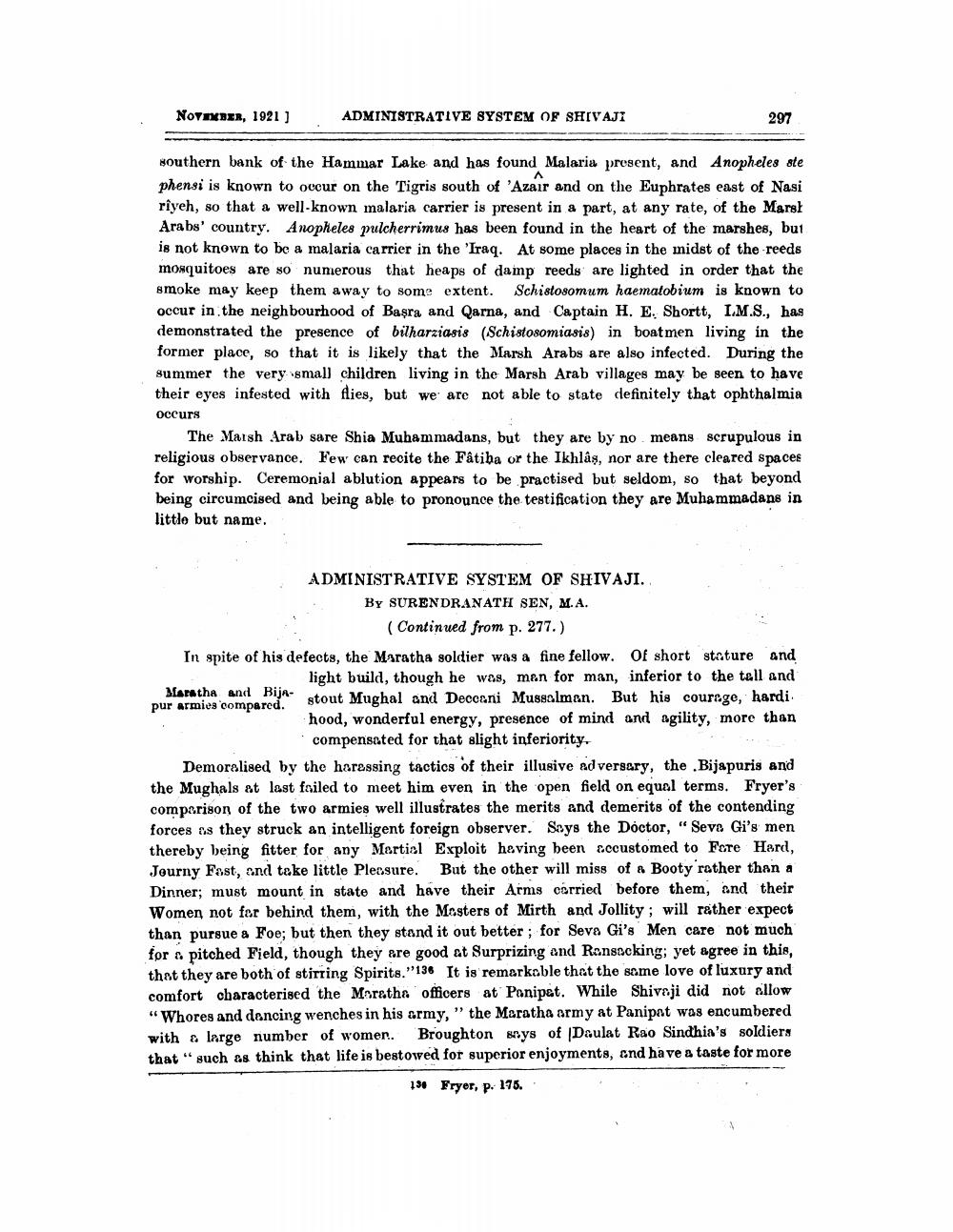________________
NOVEMBER, 1921]
ADMINISTRATIVE SYSTEM OF SHIVAJI
297
Houthern bank of the Hammar Lake and has found Malaria present, and Anopheles ste phensi is known to occur on the Tigris south of 'Azair and on the Euphrates east of Nasi riyeh, so that a well-known malaria carrier is present in a part, at any rate, of the Mars! Arabs' country. Anopheles pulcherrimus has been found in the heart of the marshes, but is not known to be a malaria carrier in the 'Iraq. At some places in the midst of the reeds mosquitoes are so numerous that heaps of damp reeds are lighted in order that the smoke may keep them away to some extent. Schistosomum haematobium is known to occur in the neighbourhood of Başra and Qarna, and Captain H. E. Shortt, L.M.S., has demonstrated the presence of bilharziasis (Schistosomiasis) in boatmen living in the former place, so that it is likely that the Marsh Arabs are also infected. During the summer the very small children living in the Marsh Arab villages may be seen to have their eyes infested with flies, but we are not able to state definitely that ophthalmia occurs
The Marsh Arab sare Shia Muhammadans, but they are by no means scrupulous in religious observance. Few can recite the Fâtiba or the Ikhlas, nor are there cleared spaces for worship. Ceremonial ablution appears to be practised but seldom, so that beyond being circumcised and being able to pronounce the testification they are Muhammadans in little but name.
ADMINISTRATIVE SYSTEM OF SHIVAJI.
BY SURENDRANATH SEN, M.A.
( Continued from p. 277.) In spite of his defects, the Maratha soldier was a fine fellow. Of short stature and
light build, though he was, men for man, inferior to the tall and Maratha and Bijapur armies compared.
stout Mughal and Deccani Mussalman. But his courage, hardi. 3 hood, wonderful energy, presence of mind and agility, more than
compensated for that slight inferiority. Demoralised by the harassing tactics of their illusive adversary, the .Bijapuris and the Mughals at last failed to meet him even in the open field on equal terms. Fryer's comparison of the two armies well illustrates the merits and demerits of the contending forces as they struck an intelligent foreign observer. Soys the Doctor, “Sevs Gi's men thereby being fitter for any Martial Exploit having been accustomed to Fore Hard, Journy Fast, and take little Pleasure. But the other will miss of & Booty rather than a Dinner; must mount in state and have their Arms corried before them, and their Women not for behind them, with the Masters of Mirth and Jollity; will rather expect than pursue a Foe; but then they stand it out better; for Seva Gi's Men care not much for a pitched Field, though they are good at Surprizing and Ronsocking; yet agree in this, that they are both of stirring Spirits."136 It is remarkable that the same love of luxury and comfort characterised the Moretha officers at Panipat. While Shivaji did not allow “Whores and dancing wenches in his army," the Maratha army at Panipat was encumbered with a large number of women. Broughton anys of Daulat Rao Sindhia's soldiers that " such as think that life is bestowed for superior enjoyments, and have a taste for more
186
Fryer, p. 175.




